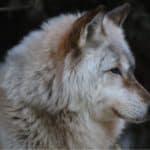Luna- Medical Update
“Situational Awareness”… these two words describe the most important skill in wolf care (well, maybe second behind social interaction), but having the ability to acknowledge the normal circumstances of wolf interactions and assess when something is not quite right. Wolf care is done 365 days a year; there is always someone caring for the ambassador wolves and every wolf receives a complete visual if not hands-on interaction during wolf care. This is the summary of what we have experienced with Luna in the last few weeks. Staff had noticed that she wasn’t as willing to allow body work which had been such a critical part of her routine. She was displaying a lot of antagonistic behavior towards Aidan during a time when we typically see a bit of pair bonding from these two “former Exhibit Pack leaders”. The most notable observation was that Luna was not interested in her morning breakfast. If you have spent anytime near Luna, you would know that food possession is her favorite past time. This “situation” started in late February. On February 24th, staff documented a spot of blood that could have been the result of a scuffle over a cache or a favorite resting spot (Luna likes a bed in the sun, but so does Aidan). On any physical abnormality, our USDA Vet Care Plan calls for a consult with our local veterinarian and depending on the circumstance, a course of antibiotics is often prescribed rather than risk anesthesia for a veterinary visit, especially in winter months. On the 24th, we started a 14-day treatment of antibiotics and staff continued to try to physically assess the status. Issues were complicated by Luna scratching the area and causing more irritation as well as sub-zero temperatures that increased immobilization and recovery risks (always a risk assessment in any action with captive wolves). But, it was apparent that we saw limited improvement from the antibiotics and we needed to have a complete veterinary exam. On the morning of March 12th, staff assembled at 7 am for the immobilization; Staff discovered what appeared to be a mass on her neck that had ruptured overnight. She was immediately taken to our longtime vet for a 90-minute surgery to remove the mass and provide adequate stitches to aid in healing for a wolf that would not be wearing a protective cone when she returned to her retired packmates. By noon, she was back at the Center and slowly returning to her old form. She slept in the Wolf Care Center with the wolf curator, and by 3 am, she even showed some signs of food possession, which should surprise none of you! Luna will have wolf care volunteers staying in the wolf lab to listen and implement “Situational Awareness” through the weekend.




